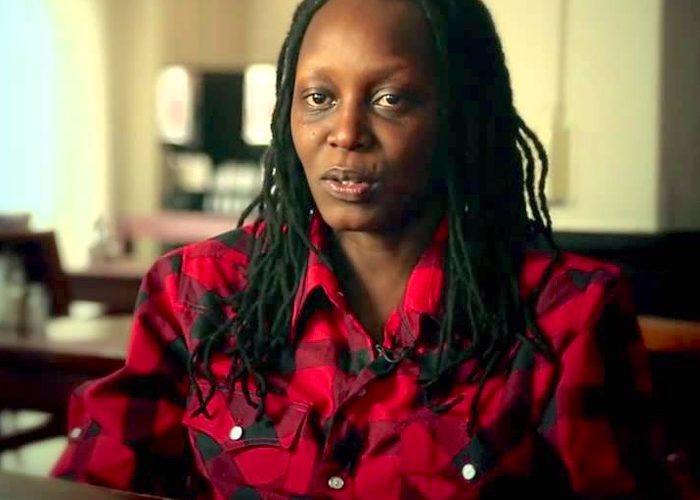Kasha Jacqueline Nabagesera was born April 12, 1980, in Kampala, Uganda. Her father was a prince. He and Kasha’s mother both worked for the Bank of Uganda.
As a child, Kasha did not act like other girls. She wore pants to school instead of the expected skirt. Kasha’s mother allowed her to be herself. Being herself got Kasha in trouble, especially when she wrote love notes to other girls. When caught, she was expelled from school.
In Uganda, homosexuality is illegal.
Kasha lived her life openly. But she both observed and experienced discrimination, harassment, and physical abuse because of her sexual orientation. For example, an unidentified person attacked Kasha with a hard, sharp object after she exited a taxi because another person refused to share a ride with a lesbian. College provided no refuge. School officials made her sign a letter promising to stay far away from a girls’ hostel for no reason other than their own fear and hatred of homosexuality.
Despite challenges such as these, Kasha graduated from college with degrees in accounting and business administration. Then, in 2003, she and a group of friends founded Freedom and Roam Uganda (FARUG). The group planned to combat discrimination with education and change the homophobic policies and laws that had harmed members of the lesbian, gay, bisexual, and transgender/transsexual (LGBT) community. Kasha served as FARUG’s executive director for 10 years.
One of Kasha’s toughest battles was against the Anti-Homosexuality Bill. Parliament passed the bill in December 2013. Under this bill, people convicted of homosexual acts could be sentenced to life imprisonment. Even people who support homosexuality could face punishment. The law basically permitted continued discrimination and persecution of homosexuals. Kasha and her associates challenged the law on legal technicalities. They succeeded in getting the law overturned by a constitutional court in August 2014. In an interview following the decision, Kasha said, “I am no longer criminal, today we have made history for generations to come.” Supporters of the bill, however, are still expected to appeal the court’s decision.
Kasha has gained international recognition for her human rights advocacy. Her honors include the Martin Ennals Award for Human Rights Defenders (2011), the Nuremberg International Human Rights Award (2013), and The Right Livelihood Award (2015).
Although her life remains in constant danger, Kasha still lives in Uganda with her partner. She continues to fight homophobia in Africa and around the world.
References
Hamrud, A. (27 November 2015). “They say they want to cut my throat.” OTTAR. Retrieved from ottar.se/artiklar/they-say-they-want-cut-my-throat
Human Rights Education and Research Center. (n.d.). “Kasha Jacqueline Nabagesera.” Retrieved from cdp-hrc.uottawa.ca/en/biography/kasha_jacqueline_nabagesera
“Kasha Jacqueline Nabagesera: Working for LGBTI Rights in Uganda.” (n.d.). Front Line Defenders. Retrieved from frontlinedefenders.org/KashaJacquelineNabagesera
“Kasha Nabagesera.” (n.d.). Wikipedia. Retrieved from en.wikipedia.org/wiki/Kasha_Nabagesera
Kinoti, K. (23 February 2010). “FARUG Director, Kasha Jacqueline Speaks to AWID on Anti-Homosexuality Bill.” Retrieved from farug.blogspot.com
Moshenberg, D. (1 August 2014). “Kasha Jacqueline Nabagesera: ‘I am no longer criminal, today we have made history.’” Women In and Beyond the Global. Retrieved from womeninandbeyond.org/?p=15821
Pfeffer, S. (14 April 2014). “Many people want me dead.” The European magazine. Retrieved from theeuropean-magazine.com/kasha-jacqueline-nabagesera–2/8354-homophobia-in-uganda
The Right Livelihood Award. (2015). “Kasha Jacqueline Nabagesera (Uganda).” Retrieved from rightlivelihood.org/nabagesera.html
“Uganda court scraps anti-gay law.” (1 August 2014). The Telegraph. Retrieved from telegraph.co.uk/news/worldnews/africaandindianocean/uganda/11006325/Uganda-court-scraps-anti-gay-law.html
Image credit: Martin Ennals Foundation


